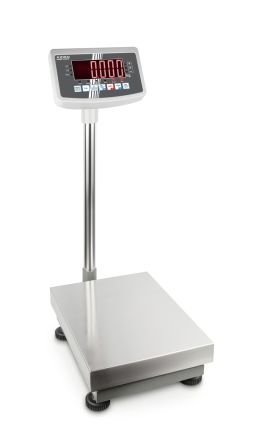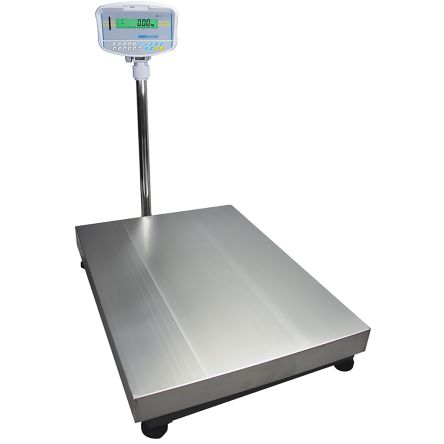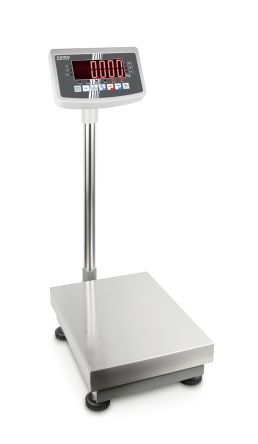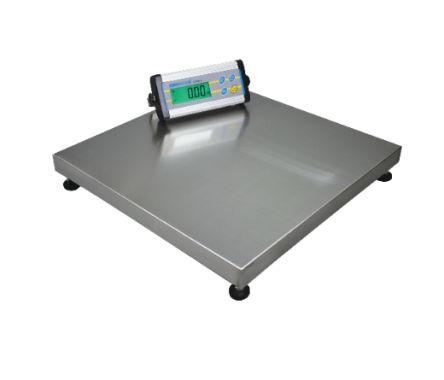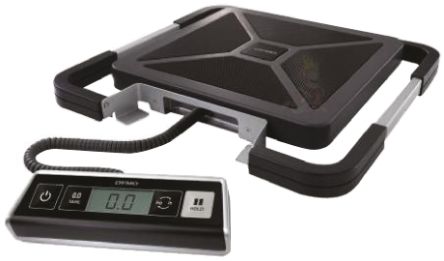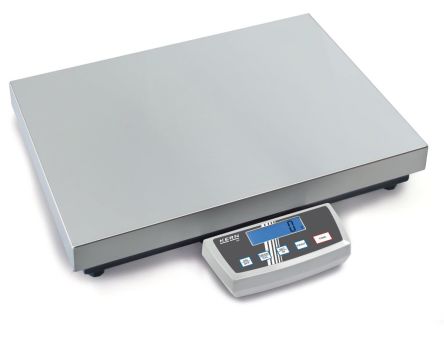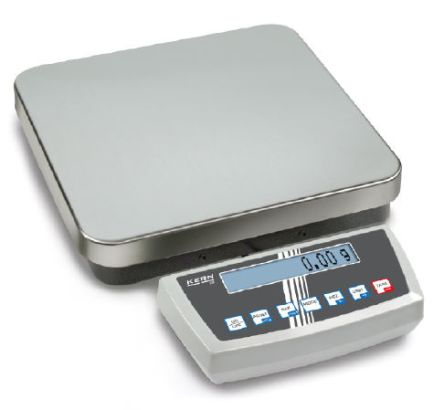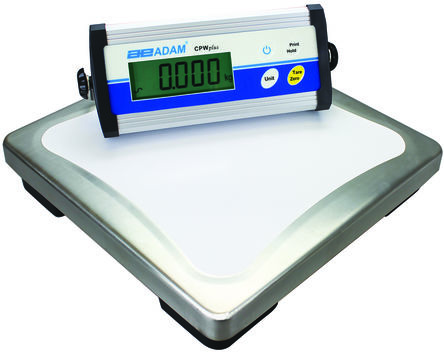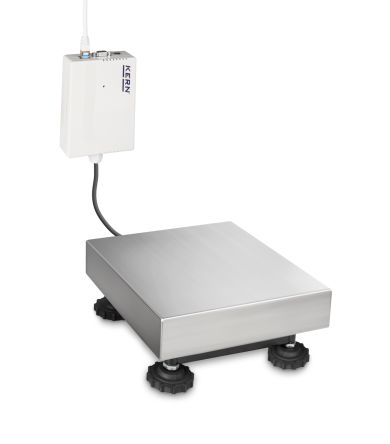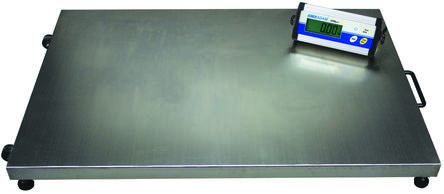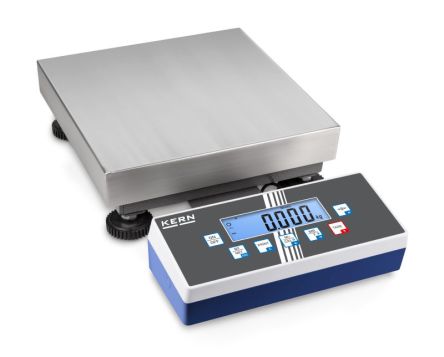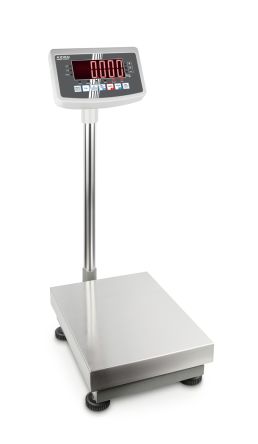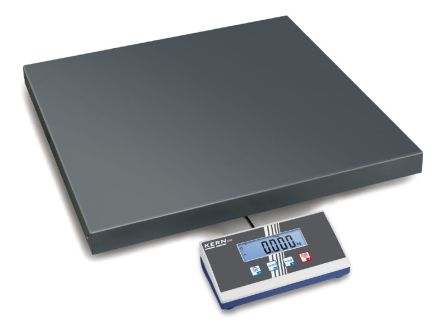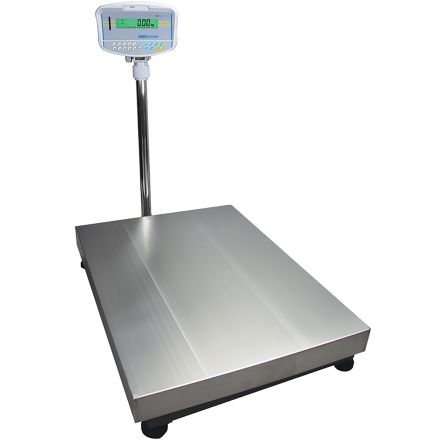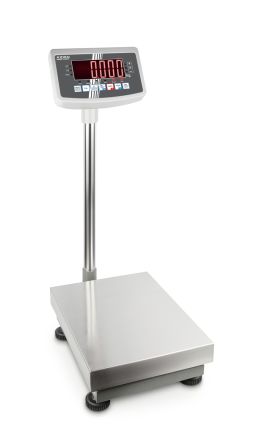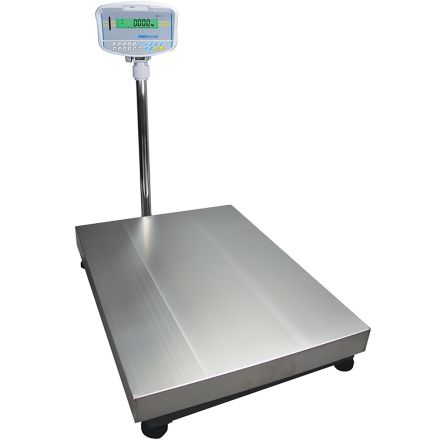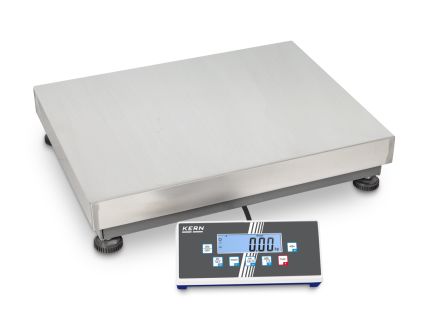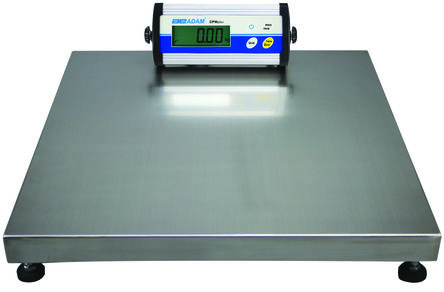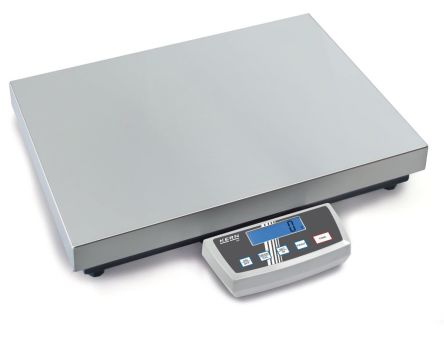- Automation & Control Gear
- Cables & Wires
- Enclosures & Server Racks
- Fuses & Circuit Breakers
- HVAC, Fans & Thermal Management
- Lighting
- Relays & Signal Conditioning
- Switches
- Batteries & Chargers
- Connectors
- Displays & Optoelectronics
- ESD Control, Cleanroom & PCB Prototyping
- Passive Components
- Power Supplies & Transformers
- Raspberry Pi, Arduino, ROCK, STEM Education & Development Tools
- Semiconductors
Platform Scales
Weighing scales are versatile devices used to measure the weight of single or multiple objects. They are typically employed for weighing smaller items such as jewellery or food. Most scales feature a plate or bowl platform on which to place the item to be weighed. Analogue scales, or mechanical scales, use a spring mechanism to read the weight of the item. In contrast, digital scales utilise load cells or strain gauges to convert the force of the weight into an electric signal, providing accurate readings ideal for applications where precision is essential.
Weighing scales can provide readings in various units, including grams (g), kilograms (kg), pounds (lbs), and stones (st). Some models offer multiple unit options, making it important that you choose a device that is suitable for your application.
Types of Weighing Scales
Weighing scales are available in a wide range of sizes, capacities, and configurations to suit various applications. Common types include:
Bench Weighing Scales
Bench scales are designed for use on workbenches or counters and are commonly used in laboratories, schools, warehouses, and retail environments for weighing smaller materials.
Counting Weighing Scales
Counting scales can weigh objects while simultaneously counting them, which replaces manual counting and helps prevent human error. They are often utilised in manufacturing and inventory management processes.
Hanging Weighing Scales
Hanging scales measure weight when the load is suspended from the scale using a hook or strap. The weight is displayed on a digital readout or a mechanical dial.
Crane Weighing Scales
Crane scales are specialised hanging scales designed for heavier items. They are integrated into cranes or hoists, allowing for the weighing of loads during lifting and moving operations. The weight is typically displayed on a large, easy-to-read digital display that can be seen from a distance.
Pocket Scales
Pocket scales are compact devices designed for weighing on the go. They are small enough to fit in a pocket and are often used for weighing small quantities of materials, jewellery, or medications. The weight is usually displayed on a digital screen.
Digital/Electronic Weighing Scales
Digital or electronic weighing scales use sensors and electronic components to measure weight and display it on a digital readout. They offer high accuracy, ease of use, and a range of features, such as tare function and unit conversion.
Analytical Weighing Scales
Analytical balances are highly precise weighing scales used in laboratories for measuring very small masses, often in the milligram or microgram range. They are essential for scientific research, chemical analysis, and pharmaceutical applications.
Precision Weighing Scale
Precision weighing scales offer a high degree of accuracy and are used in applications where precise weight measurements are critical, such as in quality control, research, and production. They are available in various capacities and resolutions to meet specific needs.
Platform Weighing Scale
Platform scales are designed for weighing larger or heavier items. They feature a large platform on which the load is placed, and the weight is displayed on a digital readout or a mechanical dial. They are commonly used in warehouses, shipping facilities, and industrial settings.
Applications of Weighing Scales
Weighing scales have endless uses across various industries and applications in Singapore. Some examples include:
Jewellery Industry
In the jewellery industry, precision weighing scales are used to accurately measure the weight of precious metals and gemstones. This ensures fair pricing and accurate record-keeping for valuable items.
Food & Beverage Industry
The food and beverage industry relies on weighing scales for portion control, recipe formulation, and quality control. Electronic weighing balances are commonly used to ensure accurate measurements of ingredients and finished products.
Laboratory
As accuracy is crucial in scientific experiments and research, laboratories use a variety of weighing balances, including analytical balances, for the precise measurement of chemicals, samples, and other materials.
Medical
Weighing scales are used in medical settings to monitor patient weight, track changes in body mass, and administer medications accurately.
Pharmaceutical
The pharmaceutical industry relies heavily on precision weighing scales and analytical balances for precise measurement of ingredients in drug formulation and quality control processes.
Industrial Settings
Weighing scales are essential in industrial settings for weighing raw materials, finished goods, and inventory. They are used in manufacturing, production, and quality control processes.
Construction
Weighing scales are used in construction to measure the weight of materials, ensure proper mixing ratios for concrete, and monitor loads on structures.
Agriculture
In agriculture, weighing scales are used to measure crop yields, weigh livestock, and determine the appropriate amount of feed and fertilisers.
Logistics & Shipping
Weighing scales are critical in logistics and shipping for determining the weight of packages and ensuring accurate shipping costs and compliance with weight restrictions.
Maintaining Weighing Scales
Using a weighing scale regularly could decrease its level of accuracy, and it is important that your scales give accurate readings. One way to ensure this is by calibrating your scales. RS offers a calibrated option and a yearly calibration service that is up to the RSCAL standard. However, it is also important to know how to maintain your weighing scales properly. Here are the steps:
- Regular Cleaning: Keep the scale clean by wiping it down with a soft cloth after each use. Avoid using harsh chemicals or abrasive cleaners that could damage the surface.
- Proper Handling: Handle the scale with care, avoiding dropping or impacting it, which could affect its accuracy.
- **Storage: **Store the scale in a clean and dry environment when not in use. Avoid exposing it to extreme temperatures or humidity.
- Calibration Checks: Routinely check the calibration of the scale using calibrated weights to ensure it is providing accurate readings.
- Professional Servicing: If there are any issues with the scale's accuracy or functionality, have it serviced by a qualified technician.
How to Choose the Right Weighing Scale
When selecting a weighing scale:
- Identify Your Needs: Small items like jewellery will require more sensitive weighing scales with a lower threshold, while larger items like boxes may need a heavy-duty weighing scale or crane scale.
- Consider Capacity Requirements: Ensure the scale has an adequate capacity rating based on your intended use.
- Look at Precision Levels Needed: Different applications require varying levels of accuracy. Laboratory equipment may require precision weighing scales.
- Evaluate Features: Consider features like tare functions (to subtract container weight), unit conversion options (to switch between measurements), and connectivity options if data logging is desired in your electronic weighing scale.
The Leading Supplier and Distributor of Weighing Scales
RS Singapore is a trusted supplier and distributor of weighing scales featuring industry-trusted brands like Kern, Adam Equipment Co Ltd, RS PRO, and many more. We offer competitive prices and reliable weighing scales from top manufacturers to ensure accurate and efficient weighing solutions for various industries and applications.
We also carry other essential test and measurement equipment, such as magnifying lamps and digital calipers, providing comprehensive solutions for all measurement tasks.
Order your platform weighing scale, bench weighing scale, digital weighing scale, and other accessories online today and enjoy next-day delivery or self-collection at your local branch. For more details on our ordering process, delivery services, and delivery fees, please refer to our Ordering Page and Delivery Page.
Related links
- Kern PNJ 600-3M+C Precision Balance Weighing Scale, 620g Weight...
- Kern EOC 30K-4 Platform Weighing Scale, 35kg Weight Capacity
- Ohaus Europe GmbH CX621 Weighing Scale Weighing Scale, 620g Weight Capacity
- Ohaus Europe GmbH NV1201 Weighing Scale Weighing Scale, 1.2kg...
- Ohaus Europe GmbH i-C31M35R Weighing Scale Weighing Scale, 35kg...
- CX5200 Weighing Scale Weighing Scale, 5.2kg Weight Capacity
- PX224 Weighing Scale Weighing Scale, 220g Weight Capacity
- Ohaus Europe GmbH i-C31M200L Weighing Scale Weighing Scale, 200kg...
